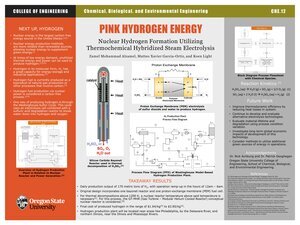
College of Engineering Unit:
Power infrastructure within the United States and abroad is becoming increasingly more reliant on renewable sources of energy and less dependent on hydrocarbon fuels. However, renewable sources are often limited in their ability to reliably match power output with utilization. Nuclear energy supplemented with hydrogen production may be able to bridge this gap by producing hydrogen at off-peak energy hours, when energy production exceeds utilization. Hydrogen production powered by electricity and thermal energy supplied by nuclear reactors is a prospective field of research due to hydrogen’s industrial applications and anticipated use as a fuel. Hydrogen produced from nuclear energy is considered “pink” hydrogen, due to being carbon-free but still reliant on non-renewable nuclear energy.
The focus of this study is to review current research on nuclear hydrogen and develop a preliminary design for a hydrogen production model centered around the Hybrid Sulfur (HyS) Cycle utilizing a photon exchange membrane (PEM) electrolysis cell.
| Attachment | Size |
|---|---|
| 574.65 KB |